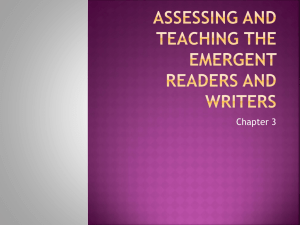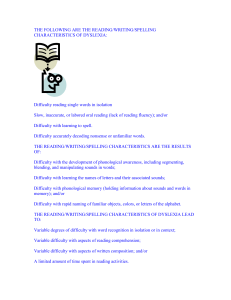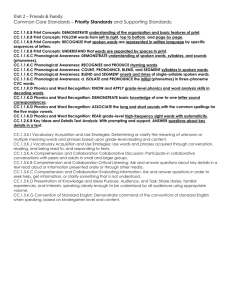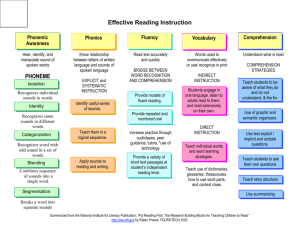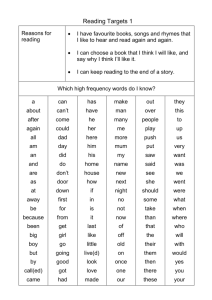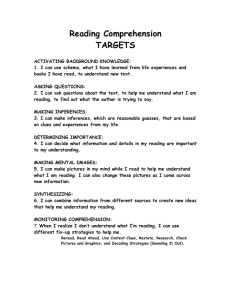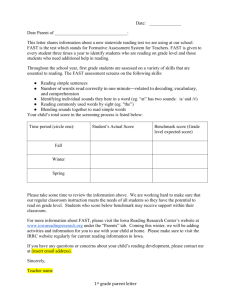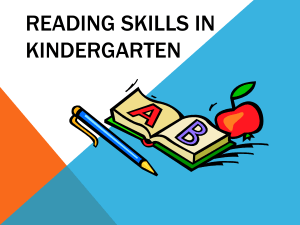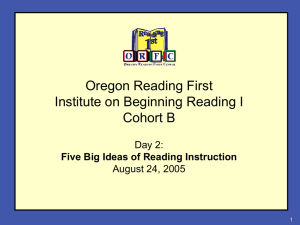Unit 1- Welcome to Kindergarten Common Core Standards – Priority
advertisement
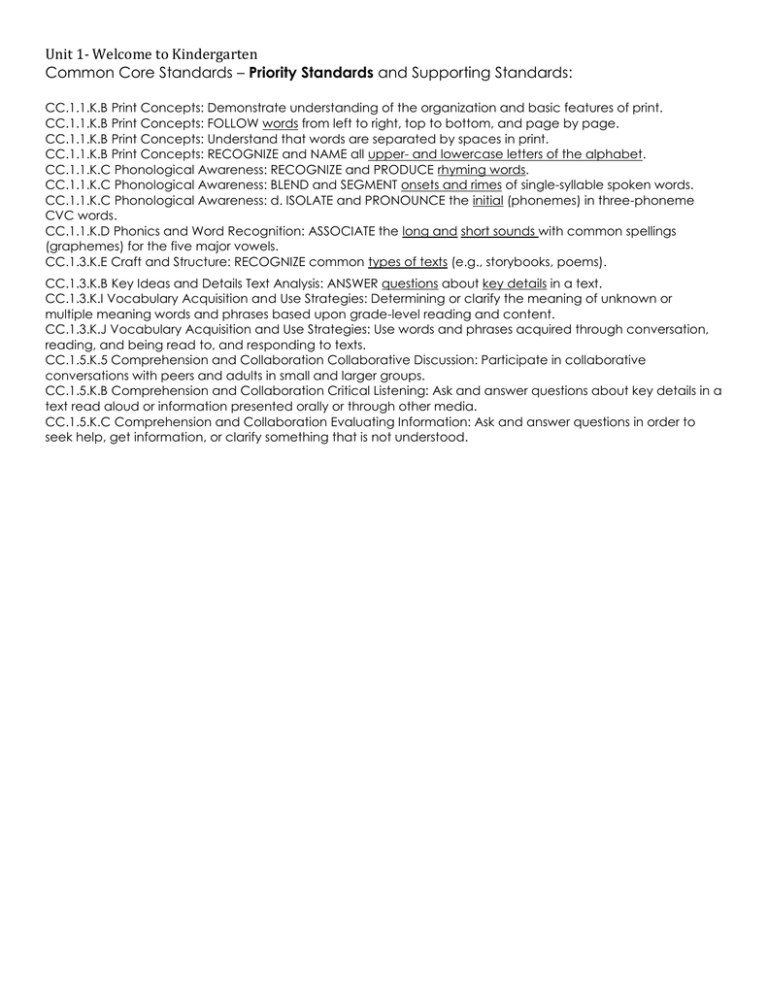
Unit 1- Welcome to Kindergarten Common Core Standards – Priority Standards and Supporting Standards: CC.1.1.K.B Print Concepts: Demonstrate understanding of the organization and basic features of print. CC.1.1.K.B Print Concepts: FOLLOW words from left to right, top to bottom, and page by page. CC.1.1.K.B Print Concepts: Understand that words are separated by spaces in print. CC.1.1.K.B Print Concepts: RECOGNIZE and NAME all upper- and lowercase letters of the alphabet. CC.1.1.K.C Phonological Awareness: RECOGNIZE and PRODUCE rhyming words. CC.1.1.K.C Phonological Awareness: BLEND and SEGMENT onsets and rimes of single-syllable spoken words. CC.1.1.K.C Phonological Awareness: d. ISOLATE and PRONOUNCE the initial (phonemes) in three-phoneme CVC words. CC.1.1.K.D Phonics and Word Recognition: ASSOCIATE the long and short sounds with common spellings (graphemes) for the five major vowels. CC.1.3.K.E Craft and Structure: RECOGNIZE common types of texts (e.g., storybooks, poems). CC.1.3.K.B Key Ideas and Details Text Analysis: ANSWER questions about key details in a text. CC.1.3.K.I Vocabulary Acquisition and Use Strategies: Determining or clarify the meaning of unknown or multiple meaning words and phrases based upon grade-level reading and content. CC.1.3.K.J Vocabulary Acquisition and Use Strategies: Use words and phrases acquired through conversation, reading, and being read to, and responding to texts. CC.1.5.K.5 Comprehension and Collaboration Collaborative Discussion: Participate in collaborative conversations with peers and adults in small and larger groups. CC.1.5.K.B Comprehension and Collaboration Critical Listening: Ask and answer questions about key details in a text read aloud or information presented orally or through other media. CC.1.5.K.C Comprehension and Collaboration Evaluating Information: Ask and answer questions in order to seek help, get information, or clarify something that is not understood. Unit 1- Welcome to Kindergarten Essential Questions 1. What can I do to figure out words I don't know when I am reading? 2. What can I do to make sure I understand what I am reading? 3. How can I share my ideas through writing? Big Ideas I can use strategies to figure out words I don’t know what I am reading. I can use picture clues to figure out what the word may be. I break words up into parts that I know and then put them back together. I can look at the first letter in the word and get my mouth ready to say the word. I can stretch out each sound in a word and then blend them together. I can skip the word and then come back to it. I can think about the other words in the sentence and ask what makes sense I can use strategies to understand what I am reading. (strategies change in each unit) I can visualize what the author is telling me. I can make predictions about what may happen as I read. I can make connections between what I am reading and things I have done, other books I have read and things I have seen in the world. I can think about what I want to write and break the sentences into words and the words into letter sounds. Unit 1- Welcome to Kindergarten Foundational Reading Skills Phonemic Awareness Recognize Rhyming Words Isolating beginning sounds (sound matching) Concepts of Print Left to right Top to bottom Page by page Words separated in print Organization of basic features of print Differences between letters and words Phonics/ Fundations – Unit 1 Letter Name Letter Sounds Short Vowels Consonants Letter Formation Speaking & Listening Rules for discussion Conversation (multiple exchanges) Ask and answer questions to get information Word Study High-frequency words Word families (see approved lists) Reading and Writing Workshop Reading Skills and Strategies Student Friendly – Reading Learning Targets Decoding Decoding Strategies I can use strategies to figure out words I don’t know Concepts of Print what I am reading. Chunking I can use picture clues to figure out what the word Stretching Words may be. Reread I break words up into parts that I know and then put Get your mouth ready them back together. Picture Clues I can look at the first letter in the word and get my Skip the word and come back mouth ready to say the word. Flip the vowel sound I can stretch out each sound in a word and then blend them together. I can skip the word and then come back to it. I can think about the other words in the sentence and ask what makes sense Comprehension Strategies Visualize, Predictions, Make Connections Comprehension I can use strategies to understand what I am reading. (strategies change in each unit) I can visualize what the author is telling me. I can make predictions about what may happen as I read. I can make connections between what I am reading and things I have done, other books I have read and things I have seen in the world. Skills Retelling Skills I can retell familiar stories with key details in correct order. I can identify the main events of a story I can tell the character, settings, problem, solution and ending of the story. Unit 1- Welcome to Kindergarten I can ask and answer questions about key details in a text. I can listen for key details in a text I can give details about key details in a text. I can support my answers with evidence from the text. Ask and answer question about key details Types of text (poems, stories, informational) Concepts of print I can follow print from left to right. I can follow print from top to bottom. I can distinguish words from letters or groups of letters. I can recognize the relationship between letters and sounds. Writing Skills and Strategies Focus I can think about what I want to write and break the sentences into words and the words into letter sounds. Skills I can follow print from left to right. I can follow print from top to bottom. I can distinguish words from letters or groups of letters. I can recognize the relationship between letters and sounds. I can recognize different types of text. Writing Skills and Strategies Focus What I say, I can write Skills Print Awareness Word Awareness See Trimester 1 and review journals to determine. Possible Vocabulary Opposites Describing Verbs – (same general action; walk, strut, march) Understanding categories (things you see at school, food, body parts) Real life connection for words and their uses (colorful places at school) Color words Position words Number words Body parts Vehicles to Model Decoding Anchor Text to Model Comprehension Strategies Title Strategy Focus *A Bad Case Of Stripes by David Shannon Visualizing *Ms. Bindergarten Gets Ready For Kindergarten by Joseph Slate *Chrysanthemum by Kevin Henkes Predictions *The Kissing Hand by Audrey Penn *Wemberly Worried by Kevin Henkes Connections *My Five Senses by Aliki

